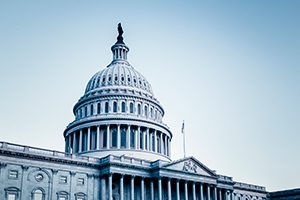5 Public Policy Issues That Could Impact Higher Ed This Year
During the recent Quarterly Washington Update webinar, CUPA-HR’s government relations team provided an overview of the current federal legislative and regulatory landscape, as well as details on the issues that may impact your campus and higher ed institutions across the country. Here are some of the top issues:

1) Pro-Union Legislation
Democrats renamed the Education Workforce Committee to the Education and Labor Committee, which reflects their ongoing emphasis on using policy to increase union membership to strengthen the middle class. On the legislative front, this union membership drive is expected to manifest itself in multiple bills trying to make changes to the National Labor Relations Act.
Last year, Democrats introduced two bills — the Workforce Democracy Act and the Workers Freedom to Negotiate Act — both of which contained provisions that would make it easier for unions to organize employees and strengthen the union position at the bargaining table. Many employers argue that the provisions in the bills infringe on long-standing employer/employee rights and will make it harder for employers to rely on vendors, reduce opportunities to franchise, and make it harder to operate in the “gig” economy.
While these bills are unlikely to get any attention in the Republican Senate, Democrats want to increase attention on the issues and advance legislation with the hope that they will take the White House and the Senate in 2020, where they’d be able to pass such legislation.
2) Minimum Wage Increase
The House is expected to pass legislation that would increase the minimum wage to $15 per hour over the next six years. The Trump administration and the Senate could come up with a minimum wage compromise, as the White House and U.S. Chamber of Commerce have signaled they are open to negotiating an increase of some sort.
3) Overtime Changes
The Department of Labor has sent proposed changes on overtime regulations to the Office of Management and Budget for approval, but the timeline has shifted due to the government shutdown. The proposed rule should be released before March, and CUPA-HR will file comments at that time.
4) Guidance on the Joint Employer Standard
The final joint employer rule should be presented later this year. In December, the U.S. Court of Appeals for the D.C. Circuit issued a decision in Browning-Ferris, which will shape the rule moving forward and provide the National Labor Relations Board with parameters on how to proceed.
5) Proposed Rule on Title IX
The U.S. Department of Education issued a proposed rule on November 16, 2018, detailing how colleges and universities must handle allegations of sexual assault and harassment under Title IX of the Education Amendments of 1972. This long-awaited proposal is the first action by the Education Department since last September, when it rescinded guidance issued in 2011 by the Obama administration.
To learn more about the most pressing legislative and regulatory issues with implications for college and university campuses and the higher ed workplace, view the archive of the Quarterly Washington Update webinar (accessible only to CUPA-HR members).


